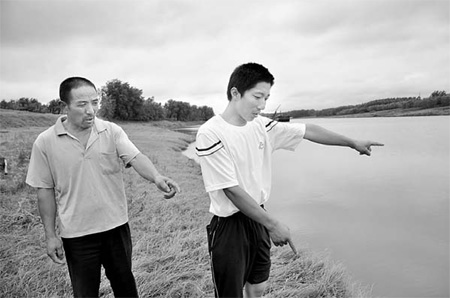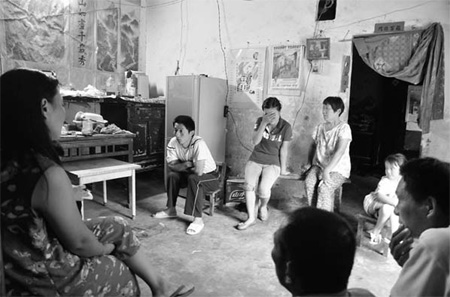Society
Home alone in the countryside
By Zhang Yue (China Daily)
Updated: 2010-08-13 08:23
 |
Large Medium Small |
|
Villagers point out where the five children drowned in Shahe River, a branch of Huaihe River in Anhui province. Witnesses say three of those killed had tried to swim into the middle of the river. Provided for China Daily |
The parents of Chen Jian said they had experienced the same problem.
"I felt my heart breaking to pieces every time I left home after Spring Festival (the Chinese Lunar New Year and a traditional time for migrant workers to return home)," said Xie Zhenyue, the boy's mother, who has sold fruit with her husband in Beijing for six years.
"I knew he wanted to stay with me but it was so hard for us to get him educated in Beijing," she added while crying.
As well as grieving for her lost son, Li now must decide how to improve the life of her daughter, Chen Ting, and prevent her from being involved in a similar tragedy.
Although she will start primary school this September, the 6-year-old speaks the local Anhui dialect and barely understands a word of Mandarin, largely because the only people she communicates with are her grandparents. She is shy and withdrawn and responds to most questions with a simple shake or nod of the head.
Like her brothers, she will go through childhood with very little contact with her parents.
Language of learning
A 2008 study on the living conditions of left-behind children by the All-China Women's Federation found that 34 percent of rural guardians - read elderly relatives - said they only have enough time to "keep an occasional eye on them".
About 8 percent felt they did not have enough time to ensure their charge's safety.
"These children make up a large proportion of the country's young generation," said Liu Zhengkui, an associate research fellow with Chinese Academy of Social Sciences. "If the mental health of left-behind children is ignored, over time they may grow up to be indifferent and irresponsible members of society."
Huo Shunyan, 60, looks after his 18-month-old grandson in Chenjia village, yet the boy still cannot speak a recognizable word in either Mandarin or Anhui dialect.
"We do not see anything wrong with that," said Huo. "Most children here grow up with their grandparents and we just don't have much time to talk with them. We need to work in the field and prepare three meals a day."
Research by Liu Xia, a doctor with Beijing Normal University's development psychology center, showed that left-behind children generally suffer a lower sense of dignity and life satisfaction than children who live with their parents.
Government activities are regularly organized to help youngsters cope with the mental strain.
On July 29, the Hunan provincial government paid for 19 children from Shaoyang county to travel to Dongguan, an industrial city in Guangdong, to spend the summer with their migrant worker parents.
Yet, experts say that, ultimately, parental care is essential to a child's sound development.
"Living in their hometowns with grandparents is not good for a child's future development," Wang Yongzhen at Zhejiang Normal University told the People's Daily in a recent interview. "It is much better for the kids to grow up with their parents working in big cities."
|
Relatives of Chen Yanhuai and his cousins are still deep in grief following the deaths in June. Chen's parents work in Guangdong province but rushed home after hearing about the accident. Provided for China Daily |

